I think this place in Shu-Lin sells teddy bears.
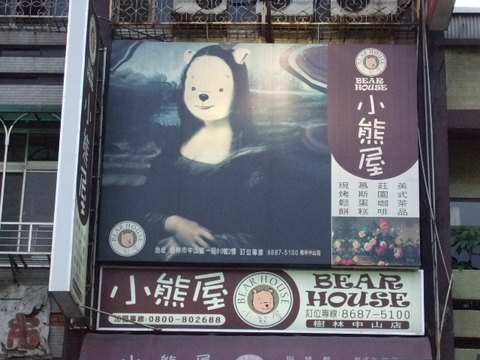
(Photo by The Foreigner)
i-1
Taiwan, China, and other things. Recovered from the defunct TypePad platform.
I think this place in Shu-Lin sells teddy bears.

(Photo by The Foreigner)
i-1
From Strategy Page:
Next year, China hosts the Olympics, and it fears reformers, and dissidents of all sorts, will use the huge influx of foreigners as an opportunity to stage anti-government demonstrations…The government considers it essential for Chinese prestige, as a "major power", that the Olympics go off without a hitch. To that end, the government will round up all known troublemakers and dissidents and put them in preventive detention for the duration of the Olympics. [emphasis added]
U.S. State Department says, "How high?"
President Chen Shui-bian showed up to give a speech in Washington, D.C. on Tuesday, despite a ban on ranking Taiwanese officials from visiting the capital:
State Department guidelines implemented in 1979 ban Taiwan’s president and other senior officials from visiting Washington, as part of Washington’s "one China" policy. A 1994 law passed by Congress overrode those restrictions, but no administration has implemented the law’s provisions to allow Taiwan’s president
and other high-ranking officials to visit Washington.
Except, President Chen didn’t really SHOW UP show up. Instead, he delivered his speech via teleconference to the National Press Club. He was in Taipei the whole time.
In Taipei. Didn’t set foot in America.
None of this pleased the State Department:
One prominent State Department official responsible for Taiwan policy…[charged] that Chen was "using teleconference technology to circumvent the ban on Taiwanese presidents coming to Washington," a Taipei Times source said.
Good Lord. This isn’t Osama bin Laden sending instructions to a gang of Jihadis in a New Jersey mosque somewhere. We’re talking about the popularly-elected head of a LIBERAL DEMOCRACY, giving a SPEECH to members of the press.
And the State Department objects to that.
The View from Taiwan had the best line on this, bar none:
What is the State Department going to do when the first 3-D tech comes out?
Dear Captain Picard:It has come to our attention that Chen Shui-bian has been appearing on the holodeck….
It’s often claimed that China will grow more open as it interacts more with democracies. But the troubling response to Chen’s speech in this case highlights the possibility that the reverse may happen. Perhaps in the end, it will be us whose values are corrupted by authoritarian China, instead.
Finally an answer I can live with, from Scientific American. It’s GENETIC, baby:
During a study of linguistic and genetic data from 49 distinct populations [two linguists have] discovered a striking correlation between two genes involved in brain development and language tonality. Populations that speak nontonal languages (where the pitch of a spoken word does not affect its meaning) have newer versions of the genes, with mutations that began to appear roughly 37 thousand years ago.
[…]
In English, the pitch at which a word is spoken conveys emotion but usually does not affect its meaning. But in many sub-Saharan African, Southeast Asian and Latin American languages[,] tone changes the meaning of words…
The new research, published this week in Proceedings of the National Academy of Sciences USA ties this difference to two genes, ASPM and Microcephalin. The exact functions of both genes are still open to debate, but they are known to affect brain size during embryonic development. "They presumably have something to do with brain structure, because there are deleterious mutations of the genes that lead to microencephaly (a condition in which a person’s brain is much smaller than the average size for his or her age), says senior study author Robert Ladd, a professor of linguistics at the University of Edinburgh in Scotland.
Ladd and colleague Dan Dediu…focused on one particular variation of each of the new genes. "They’re versions of these genes that are not only newer, but also show signatures of strong natural selection in modern humans," Ladd says. In their report, the authors note that previous studies indicate these popular new mutations do not appear to affect intelligence, brain size or social ability. But based on their strong correlation with language tone, they surmise that they may contribute to slight differences in the cerebral cortex, the outermost layer of the brain, which, among many other functions, plays a role in our ability to understand language.
Ladd and Dediu compared 24 linguistic features…with 981 versions of the two genes found in the 49 populations studied. Most of the language contrasts could be explained by geographic or historical differences. But tone seemed to be inextricably tied to the variations of ASPM and Microcephalin observed by the authors. The mutations were absent in populations that speak tonal languages, but abundant in nontonal speakers. [emphasis added throughout]
(The piece doesn’t mention the flip side of the coin, which is that the ABSENCE of the new mutations in tonal language-speaking populations suggests that these mutations provide a comparative DISADVANTAGE in that particular milieu.)
John Derbyshire at The Corner writes:
This sort of thing is the most fascinating stuff going on in science now: the slow uncovering of human nature in all its meaty & molecular actuality—the territory formerly squabbled over by philosophy, literature, and folklore yielding to cold biological fact. It’ll be a long time happening, and it will turn up things we—liberals and conservatives both—won’t like, but it’s starting.
Wild stuff, if it’s true.
Went to Miramar Shopping Complex to see Spiderman III a while back, and was a bit sad to see that the Welcome grocery store in the basement has closed down. That wasn’t a bad little store (in its variety of foreigner food). But with a Carrefour across the road in one direction and a Geant across the road in another, I guess it was pretty tough for them to turn a profit.
After the movie, I took a ride on the Miramar Ferris wheel for the first time. These pictures I took of Taipei are a bit grainy, but what do you expect at ISO 3200?
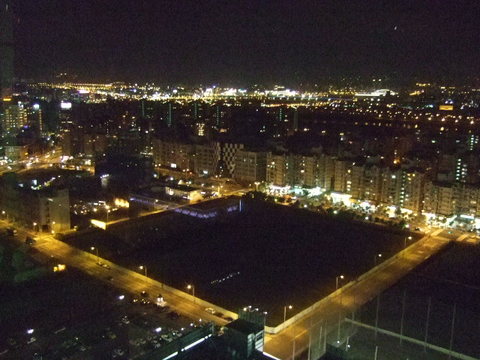
That tall building is Taipei 101 off in the distance:
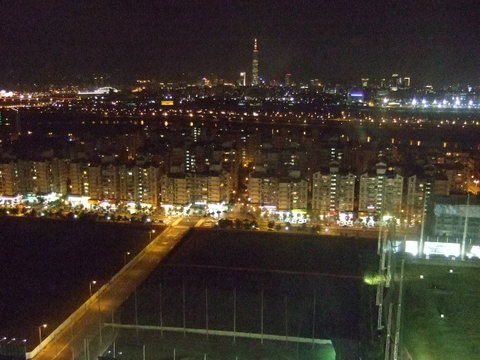
With the wall of buildings in the foreground, this looks a bit like the planet Krypton:
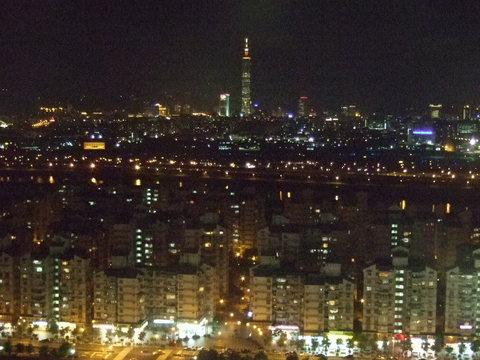
A close-up of Taipei 101:
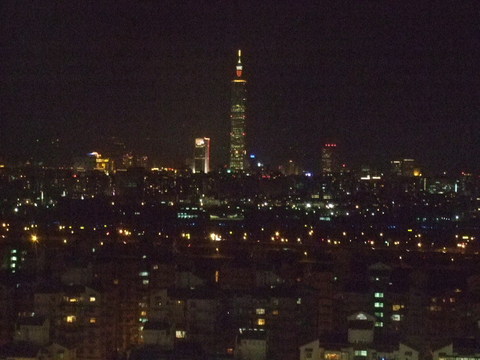
And another:
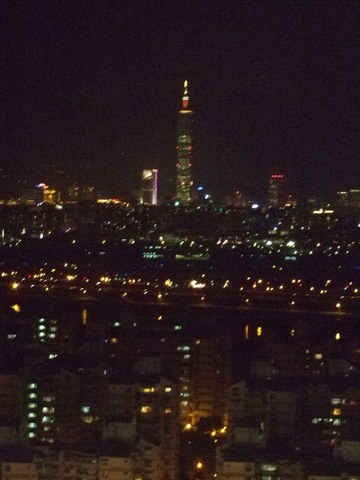
These streaks aren’t reflections off the windows, I tell you! They’re meteorites, containing creepy viscous alien life-forms!
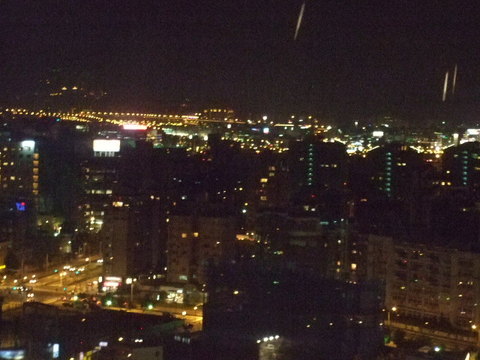
i-6
Picked up the old Spiderman animated series on DVD a couple years ago after seeing Spiderman II. Remembered loving the series as a kid, and thought I’d check it out again.
Big mistake. Those paper-thin plots may have been easily comprehensible to children, but they sure don’t hold much interest for adults. Just to give you an idea, episode in, episode out, the villain of the week cackles that soon – very soon – he’ll "rule the world".
Sorry, Rhino. Bone-head like you ain’t never gonna rule the world.
Still, there were a couple of bright spots. That jazzy late ’60s superhero music is cooler than ever. And J. Jonah Jameson – boy, is HE a hoot. Each week, no matter what Spiderman does, no matter how he saves the city, ol’ Jonah can be counted on to twist the facts in his efforts to portray Spidey as Public Enemy #1.
You just gotta admire the man’s consistency.
I only managed to get through one of the discs, but while watching it occurred to me that kids viewing the show everyday after school were actually being taught an important message from J.J.. Namely: Don’t believe everything you read in the papers. The people in charge of the mass media sometimes have their own agenda. Be skeptical.
Not a bad lesson for young folks, I’d say.
I mention all this because I recently saw Spiderman III a second time on IMAX at Miramar Village. Good fun, though I don’t think I walked away with anything deeper from it. It kind of is what it is.
Well, I did walk away with ONE thing. The thing that really struck me was the continuing presence of Uncle Ben. Usually with movies like this, the death of an important character serves as little more than a plot device; it’s there simply to provide motivation for the hero to become the HERO.
Consider Luke Skywalker. Did he give much thought afterwards to Uncle Owen, Aunt Beru or Biggs Starlighter? Maybe he did, but he sure looked happy at the end of A New Hope, considering that within the last few days he’d lost (1) his kindly mentor, (2) his foster parents, and (3) his best friend in the entire world.
Dunno about you, but I think I’d be a mess after all that. Even if I WAS getting a medal for blowing up the Death Star and saving half the galaxy!
The Parkers’ reaction to the death of Uncle Ben is quite different. Uncle Ben may have died three movies ago, but we STILL see him in flashbacks. Aunt May still talks about him. We get the sense that his tragic death has cut the heart out of this family. This character was important to them – he was loved. Uncle Ben’s gone, but not forgotten.
I expect some amount of silliness in a superhero movie, and Spiderman III did serve up its share of that. In its treatment of death however, I think there’s a certain maturity there that isn’t always to be found in movies of this genre.
My initial reaction to the way it was handled was to label it a Trainwreck, though I’m actually of several minds on the subject. Part of me is still disappointed that the Chen administration didn’t take bolder action. But another sympathizes, and even approves, of the road taken. I previously wrote that Chen should have based his actions on whether he thought they would pass legal muster; elsewhere, Michael Turton pointed out that this is something that may have been unknowable:
In addition to the ongoing struggle between the two competing nationalisms, one Taiwanese, the other Chinese, the issue also shines a light on another problem: the ambiguous lines of authority in the government here. [emphasis added] There is a general complaint that democracy has made everything messier, and it is quite true: democracy has forced the government to figure out what the rules are, and in most cases they are vastly unclear, with multiple and conflicting lines of authority. Foreigners constantly complain that different government agencies tell them different stories about what is needed to accomplish this or that, but actually that is the experience of everyone on the island, at almost every level. In the past, Taiwan was governed by men, not laws, and so to get something done, you had to find out who was in charge of that thing. But now, no matter what the issue is, lines of authority are extremely unclear.
Given uncertainty over the legality, the right approach may have been the cautious approach. Imagine first if President Chen HAD decided to make people like me happy, and ordered the "Chiang Kai-Shek" engraving jackhammered off the memorial’s facade. Then, imagine his choices if a court subsequently decided AGAINST him.
Far as I can see, he’d only have two options: backtrack by ordering the "Chiang Kai-Shek" inscription re-engraved (MAJOR loss of face!), or defy the court (thereby becoming the lawless dictator Chinese nationalists always claimed he was).
Suddenly the virtue of the banners and scaffolding, which I previously derided as half-measures, becomes clear. Chen knows the chance he may be forced to retreat on this isn’t negligible, so he’s committing as little as possible. A probing action, if you will. If he loses, he doesn’t lose much – just some temporary scaffolding and a few banners. Much preferable to the TV news endlessly repeating clips of cold, hard stone being re-engraved and lovingly polished by Chiang loyalists.
One other thought – one that isn’t original, but worth repeating just the same. If Chen’s goal here was to rename CKS Memorial Hall, then so far, he has failed. (He may yet still win, but for now, the dedication to Chiang is still etched in stone, for all to see.) If however, his goal was to bait Chinese nationalists into defending (even embracing!) Taiwan’s former dictator, then he succeeded quite spectacularly. To wit, I offer this encomium, delivered as a response by Taiwan’s China Post:
History attests that Chiang, the man and his career, stood for Freedom, Democracy and Science…*
Plenty of freedom and democracy during 4 DECADES of martial law under Chiang and son. One of the maxims of La Rochefoucauld comes to mind: "Courtiers who flatter princes with virtues they do not have, insult them with impunity…"
As a second illustration, I point to the behavior of Chiang supporters during a recent religious ceremony on site for victims of the 228 Massacre:
The ritual was performed mainly in peace, despite a few instances where opponents to the hall’s name change shouted verbal insults at the families. [emphasis added]
NIIICE. Dunno if there’s any footage of that, but it just might be useful. Come election time, I mean.
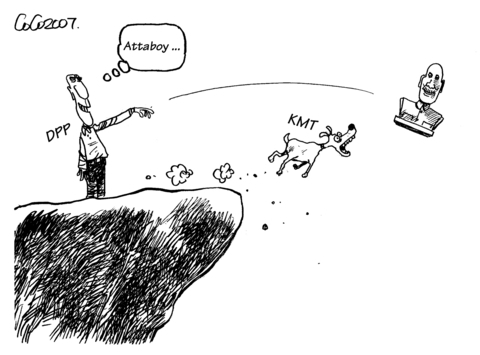
(Cartoon from the Apr 1/07 edition of the Taipei Times.)
* Digressing from the subject of this post, I thought I’d mention this curious sentence from the the China Post‘s May 21st editorial:
…Taiwan’s independence-seeking DPP government under [President] Chen, defying cautions by its mentor and protector the U.S., has resorted to pushing anti-China and anti-Chiang campaigns to advance its separatist agenda through undemocratic and illegal means.
To placate China, the U.S. has indeed voiced opposition to name changes of Taiwanese state firms. To my knowledge, however, it has been notably silent on the Taiwanese de-Chiangification campaign.
UPDATE (Jun 2/07): An overview of the issue for general readers can be found here.
i-1
People have told me of a Taiwanese superstition that says it’s bad luck if things in a pregnant woman’s home are moved around. The saying goes that if they are, the result will be that the woman will give birth to a deformed baby.
Which is all prologue to this brief story about a German study in the May 22nd edition of the China Post. (Sorry, no link available).
Women advised not to renovate during pregnancy
Bonn, dpa
Women should not have their homes renovated while they are pregnant or in the first two years of a newborn’s life because the baby’s immune system is not resistant enough to deal with the dust, and fumes from construction materials and paint.
[…]
It’s also advisable [for such families] to allow new furniture and construction materials to air out outside the home for two to four weeks before using them in the apartment.
Interesting that there might be a rational basis behind this particular superstition. (Though the article doesn’t actually mention anything about deformities, per se.)
My initial reactions to the rocky attempt to rename Chiang Kai-Shek Memorial Hall in Taipei. But first, a little background:
Earlier this year, Taiwanese president Chen Shui-bian decided to rename the Chiang memorial, on the grounds that it was inappropriate for the capital of a democracy to host giant monuments to former dictators. Because the legislature is dominated by Chinese nationalists who revere Chiang, Chen undertook the re-dedication via an administrative procedure.
After denouncing Chen for his ingenuity, Chinese nationalists in the legislature insisted that the change could only be made by an act of THEIR branch of government. Since the opposition possesses a legislative majority, they essentially believed they had a veto over the plan.
Not to be outdone, the Taipei local government (again, a body dominated by Chinese nationalists) got into the act. Invoking an administrative procedure of his own, Taipei mayor Hau Lung-bin, son of one of Chiang’s generals, designated the hall as a temporary historical site. In doing so, he put the local government on a collision course with the national executive branch, because such sites cannot be legally altered.*
(Why? Well, it’s kinda hard to rename a structure if you can’t take down the old nameplate. Or screw the new nameplate anywhere onto the walls!)
Faced with this fly-in-the-ointment, the Chen administration decided to square the circle, by covering up the old "Chiang Kai-Shek Memorial Hall" nameplate with scaffolding. Large canvas banners proclaiming "Democracy Memorial Hall" were hung from the outside walls. Finally, a new nameplate was unveiled in the gardens, in such a way that the structure was unmolested.
What a coincidence that Sunday’s Taipei Times featured a picture of an elderly protester who busied himself shouting that the president had no, uh, gonads. Because my reaction was that maybe that old coot had a point there.
I mean, if President Chen didn’t think the name change would pass legal muster, he shouldn’t have bothered with the whole endeavor. The law’s the law, even if you’re president and you don’t happen to like it. On the other hand, if Chen DID think the courts would rule in his favor, he should have insisted the old nameplate be removed. None of these phony-baloney half measures, with banners and scaffolding. To HECK with the local government. Tear down the old stone engraving, and put up the new plaque.
Yes, yes, City Hall said that anyone doing that would be arrested. But if you TRULY believe the courts will vindicate your actions, then you also have to believe that the workmen will ultimately be released. And that somebody in City Hall will in turn have to answer charges of false imprisonment of the workmen. Workmen who were, after all, only doing their job.
As it was, Chen’s wishy-washiness mollified no one. Those banners? City Hall said the NAILS used to hang ’em up damaged the "historical site". The scaffolding? Changed the site’s appearance. Grievous breaches of the law, meriting fines, said the city of Taipei.
(Not content with that, local authorities had the banners and scaffolding torn down a few days later, anyways.)
I’m sure I’m not the only one who thinks Chen comes out looking weak here – a bit like a certain duke from an old nursery rhyme:
The Grand Old Duke of York
He had 10,000 men
He marched them up the hill
And he marched them down again…
* Actually, I’m sure they CAN be altered, but only with permission from the local government. Permission which Taipei City Hall would be loath to grant.
Friday’s Taipei Times featured a front-page story about new salt-water species discovered near Taiwan. For better viewing, click on the thumbnails.
(Thankfully, one of the following has NOT been discovered. Yet.)
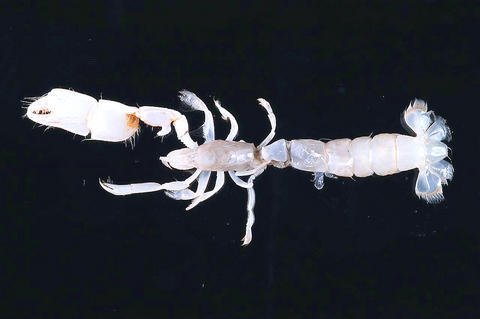
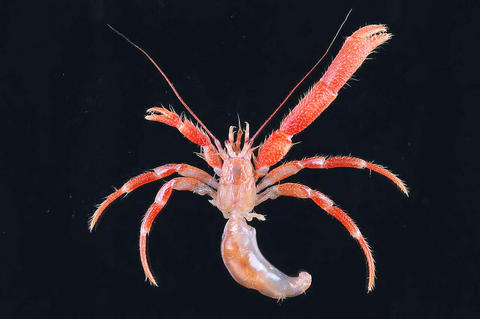
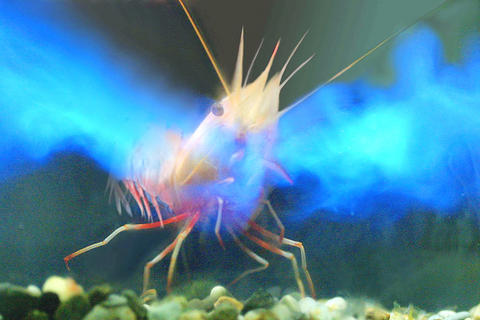
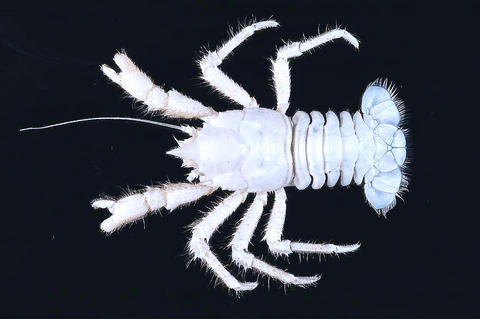
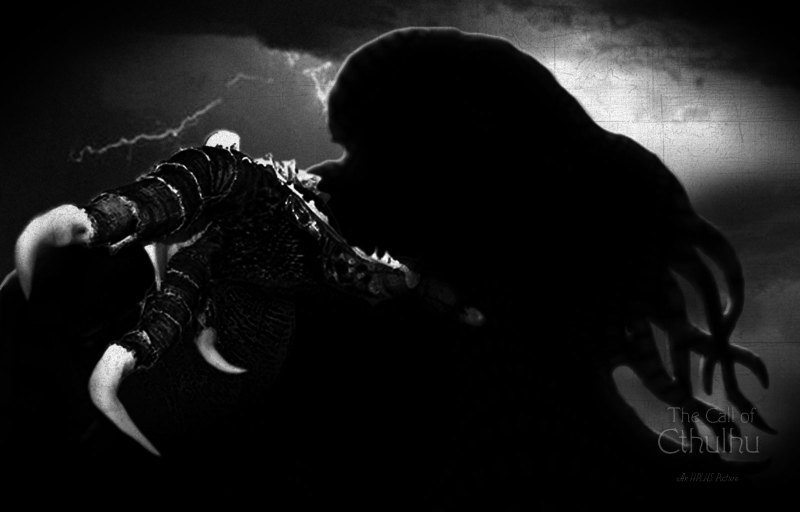
[Large images now displayed instead of the clickable thumbnails on the original TypePad site.]
i-5